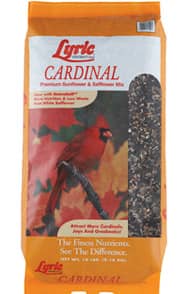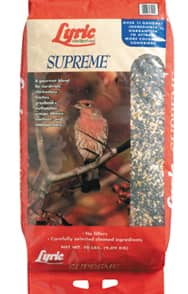January 1, 2024
Winter Birding: The Importance of Food
In Massachusetts, winter is a difficult time for birds. Days are often windy and cold; nights are long and even colder. Lush vegetation has withered or been consumed, and most insects have died or become dormant. During these extremely cold days, finding food can be especially difficult. They cannot forage as easily for food when snow accumulates or temperatures drop to freezing. Some birds remain in the same location year-round and benefit greatly from the extra food sources offered by backyard feeders. These birds require high calorie and oil rich foods to survive our winter.
During spring and summer, most songbirds eat insects and spiders, which are highly nutritious, abundant, and, for the most part, easily captured. During fall and winter, nonmigratory songbirds shift their diets to fruits and seeds to survive. This is the time of year when bird feeding enthusiasts roll out the welcome mat and set the table. The question is, what to serve to attract a diversity of birds? The answer is to provide a variety of food types. Also consider leaving your perennials untouched for the winter, as an extra food source for our winged friends. You can check out our whole blog post on the concept here!
In Massachusetts, we can expect to see the friendly Black-capped Chickadee, Tufted Titmouse, the spectacularly colored Northern Cardinal, all manner of Finch, Sparrows, Woodpeckers and Jays; for a comprehensive list, check out Mass Audubon’s website!
Which seed types should I provide?
Black-oil sunflower seeds attract the greatest number of species. These seeds have a high meat-to-shell ratio, they are nutritious and high in fat which is especially important in the winter months. Their small size and thin shells make them easy for small birds to handle and crack. Several studies, including the Cornell Lab of Ornithology Seed Preference Test, show that this high-energy food is the favorite of most birds that visit feeders. Striped sunflower seeds are popular with larger-beaked birds. These striped seeds are larger and have a thicker seed coat than black-oil sunflower.
Peanuts, and tree nuts like almonds, cashews, pecans and pistachios are enjoyed by Jays, Woodpeckers, Chickadees, Nuthatches, Carolina Wrens and Titmice. If you don’t want squirrels “going nuts” for these foods, try using a squirrel-resistant feeder.
Millet is a small round seed. It comes in white and red varieties; most birds prefer white proso millet over red. Nyjer®, or thistle seed, is a delicacy for small Finches such as Goldfinches, Siskins, and Redpolls. Offering the small-sized, premium-priced Nyjer seeds in special Nyjer feeders will provide more value for your money. These feeders come in either a sock form with a small mesh fabric, or a tube feeder with tiny ports that prevent the seeds from spilling out. Finches will pull the seeds individually through the mesh or ports to enjoy them.
Birds’ feeding habits vary based on weather patterns and season. The best thing to do is experiment with seed and your backyard feeders. Take notes and photos for a personal sense of well-being and a great activity to do with kids!


We love Lyric Bird Seed because of their superior ingredients that ensure our New England birds have their essential nutrients to thrive- especially in the winter months. A superior seed means you will attract the widest variety of birds around! All birding products are available in our Winchester, Falmouth, Tewksbury and Concord stores.
SHOP BIRDING PRODUCTS ONLINE
